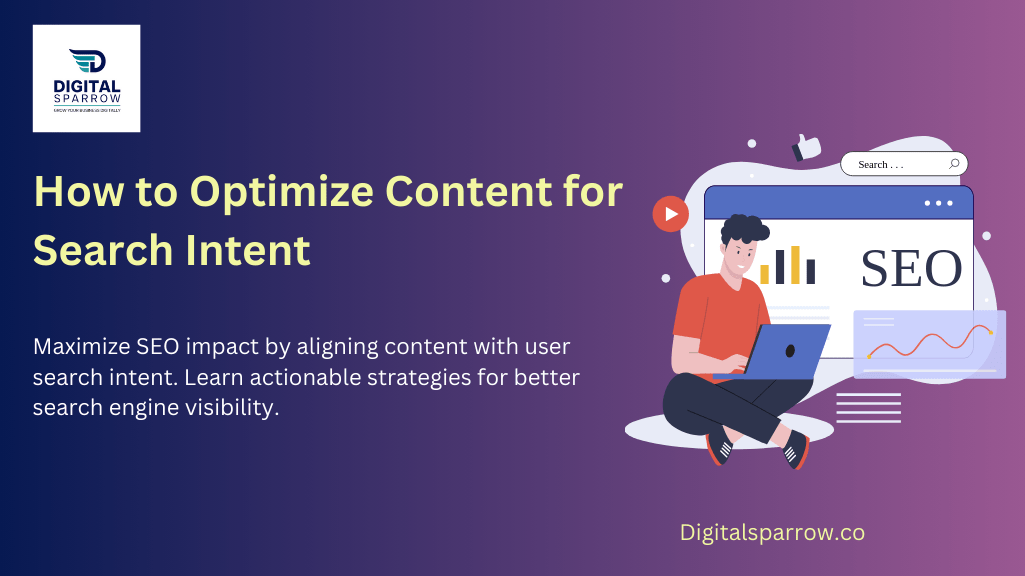Search engines have been easily incorporated into our daily lives by the digital age, making them essential resources for information and solutions. It’s important to remember that engaging with your target audience successfully is just as important as ranking well for content creators and marketers when it comes to search intent optimization. In this in-depth session, we’ll delve into the worlds of keyword intent, search intent, search queries, types of searches, and various search engines. By the conclusion, you’ll have takeaways that will improve the impact and exposure of your work.
Decoding Keyword Intent and Search Intent
Keyword intent, also known as search intent, is the motivation behind a user’s online search query. It’s like deciphering the intent behind a user’s digital footsteps. There are four main types of keyword intent:
1. Informational Intent: Users seek knowledge or answers. For instance, “Optimizing content for search intent” falls under this category.
2. Navigational Intent: Users look for a specific webpage or website. For example, searching “Facebook login page” demonstrates navigational intent.
3. Commercial Intent: Users are researching before making a decision. Searches like “best laptops for graphic design” reflect commercial intent.
4. Transactional Intent: Users are ready to make a purchase or perform an action. Keywords like “buy iPhone 13” showcase transactional intent.
Search intent goes beyond keywords and encompasses the broader goal users have during their online search. Identifying search intent involves understanding the query’s context and nuances, ranging from seeking advice to wanting to buy something.
Creating Content Aligned with Search Intent
Crafting content that resonates with search intent requires a strategic approach. Here’s how you can optimize your content:
1. The Foundation: Keyword Research- Effective keyword research is fundamental. Tools like Google Keyword Planner, SEMrush, and Ahrefs help identify relevant keywords. Remember to consider the four types of keyword intent. Choose keywords that match the intent you want to address.
2. Learning from the Best: Analyzing SERPs- Study Search Engine Result Pages (SERPs) to gain insights into search intent. When searching your target keywords, observe the types of content that rank. Are they articles, videos, or something else? Analyzing top-ranking pages reveals what Google considers relevant.
3. Comprehensive Content Creation-After analyzing SERPs, focus on creating comprehensive content that fulfills user intent. In-depth guides, articles, tutorials for informational queries; comparison guides or product reviews for commercial queries; and clear calls to action for transactional intent.
4. Understanding User Needs: Empathy is crucial. Put yourself in users’ shoes and address their questions, problems, and desires. By providing valuable solutions, your content resonates better.
5. Diversifying Content Types-Different users prefer different content formats. Incorporate text, images, and videos to cater to diverse preferences and capture traffic from various search queries.
MAY YOU LIKE: Strategies for Outshining Your Competition Online
Navigating the Realm of Search Queries
Search queries, or search terms, are what users type into search engines. Understanding query types refines your content optimization strategy:
1. Short-Tail Queries: Short and general queries, like “SEO techniques.” High search volumes but high competition.
2. Long-Tail Queries: Specific and detailed, like “best on-page SEO techniques for e-commerce websites.” Lower search volumes but higher conversion due to specificity.
3. Question Queries: Begin with question words like “how,” “what.” Directly address the user’s inquiry.
4. Transactional Queries: Indicate readiness to purchase or act, with terms like “buy,” “price.”
5. Local Queries: Include location-specific terms, crucial for local businesses.
Unveiling Search Types and Their Impact
Understanding search types further refines your optimization:
1. Navigational Searches: Users look for specific websites. Optimize for brand-related navigational searches for easy discovery.
2. Informational Searches: Users seek information. Create informative content to establish authority.
3. Transactional Searches: Users are ready to act. Persuasive content with clear paths to conversion is key.
4. Commercial Investigation Searches: Users research before deciding. Objective comparison content positions you as a reliable source.
The Search Engine Landscape: Where to Optimize
Understanding search engine types tailors your optimization approach:
1. General Search Engines: Prioritize user intent and relevance.
2. Vertical Search Engines: Create content aligned with the platform’s behavior.
3. Local Search Engines: Keep business information accurate for local visibility.
4. E-commerce Search Engines: Use product-specific keywords for better product visibility.
May you like also: The Importance of Market Research
Conclusion
Optimizing content for search intent merges keyword science with user psychology. By understanding keyword intent, search intent, search queries, and search engine types, you can refine your content strategy to captivate your audience and maximize your impact.


This design is steller! You most certainly know how to keep a reader entertained. Between your wit and your videos, I was almost moved to start my own blog (well, almost…HaHa!) Wonderful job. I really enjoyed what you had to say, and more than that, how you presented it. Too cool!
Your point of view caught my eye and was very interesting. Thanks. I have a question for you.
The core of your writing while sounding reasonable originally, did not really settle properly with me after some time. Someplace throughout the sentences you managed to make me a believer unfortunately just for a very short while. I however have a problem with your leaps in assumptions and one would do well to fill in those breaks. When you actually can accomplish that, I could undoubtedly be fascinated.
I got good info from your blog
Great post, you have pointed out some fantastic points, I besides conceive this s a very excellent website.
What i don’t understood is in truth how you are no longer actually a lot more neatly-preferred than you might be right now. You’re very intelligent. You know thus significantly in terms of this subject, produced me personally imagine it from numerous numerous angles. Its like men and women don’t seem to be interested except it¦s one thing to accomplish with Woman gaga! Your own stuffs nice. Always deal with it up!
I have read some good stuff here. Certainly price bookmarking for revisiting. I surprise how much effort you set to create such a great informative site.
I really like your writing style, superb information, thankyou for posting : D.
You are a very clever person!
Those are yours alright! . We at least need to get these people stealing images to start blogging! They probably just did a image search and grabbed them. They look good though!
I don’t think the title of your article matches the content lol. Just kidding, mainly because I had some doubts after reading the article. https://accounts.binance.com/es-MX/register?ref=JHQQKNKN